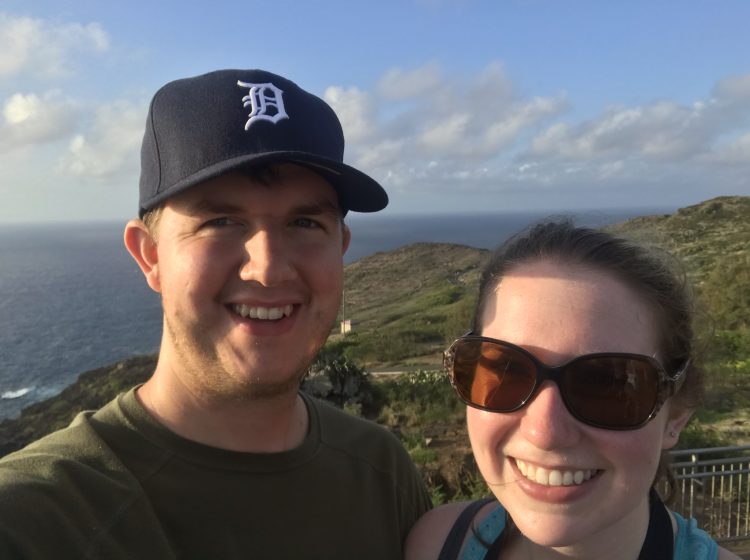I recently got married. He’s a pretty cool guy, I think I’ll keep him.
We decided on a honeymoon in Hawaii. Exciting, right? The excitement was immediately followed by straight-up terror. Something along the lines of “Hawaii?!? Yes! Sun, beaches, more sun! Oh crap. What about food? I don’t eat solid food. So that makes restaurants complicated. And airplanes. Those are basically germ factories. I’ll need antibiotics…” I went down the rabbit hole of self-doubt and symptoms analysis.
But honestly, I needed this win. (And my husband really wanted to go to Hawaii). I hadn’t traveled since before the gastroparesis and colonic inertia. When solid food is literally off the table, shit gets complicated. I also have rheumatoid arthritis — this is less of a barrier to traveling, but still something I need to consider when making plans. But again, I really needed this flippin’ win.

So we went about the planning process very carefully, and we learned some things along the way.
1. Pick your location carefully. I function best in dry heat and basically live on smoothies. So Alaska was ruled out. Turns out that Hawaii is the place to be when you don’t eat solid food. They have smoothie shops on pretty much every street corner. I was never the only person in the area drinking a smoothie, making me feel significantly less like a social pariah. It’s also still within the United States, so we wouldn’t run into any pharmaceutical issues if I ended up needing a medication filled. If you have a limit on how long you can be on a plane, pick somewhere either within that distance or find a flight with a layover. I’m one of those people — I don’t sit in one position well for long, so we always have layovers for long distance flights. We picked layover locations with a Jamba Juice, because we have our priorities straight.
2. Get insurance on everything. This is honestly good advice for anything in life. But really. Purchase insurance on your plane tickets and hotel reservation. If you have a chronic illness, your health probably isn’t particularly predictable. We’ve all had to cancel plans at the last minute. Some of us have to do so regularly. This way you can cancel plans without losing a bunch of money in the process.
3. If you have to pre-book anything, don’t books things multiple days in a row. We really wanted to see Pearl Harbor and had to book those tickets ahead of time. We took it easy the day before, and didn’t make any solid plans for the following day. When fatigue is part of your life, having two full days in a row feels roughly equivalent to climbing Mt. Everest. The last thing you need is to feel disappointed in yourself on vacation. Turns out I was OK the day after the Pearl Harbor tour, but it’s always better to play it safe.
4. If you have diet restrictions, try and find a hotel with a kitchen. Having a full kitchen in our hotel room was a lifesaver. Our first day on the island, we stocked up on crackers, baby food, and ginger ale — clearly the breakfast of champions. It meant I could pack snacks to take with us went we went out, and that I would have food on hand in case I needed anything during the night.
5. Know ahead of time where medical centers are located. There was a hospital less than a mile away from our hotel. This was intentional. We also had a Walgreen’s pharmacy within walking distance. Also intentional. We may not have needed the hospital, but we did visit the pharmacy a couple times.
6. Take all of your “as needed” or “just in case” supplies. When you have a chronic illness, you come with a lot of baggage. I don’t go anywhere for more than a couple hours without a cooler and my emergency med bag. I was gone for six days. So that’s a lot of luggage. We looked like we were moving to Oahu permanently. You don’t want to be caught without your “just in case” supplies. Especially when you’re far from home and there’s a several hour time difference between you and your doctor. Make sure to pack all of this in a carry on bag. If your luggage doesn’t make it to the destination on time, you’ll still have your medications.
7. Use a lot of hand sanitizer during the flight. Let’s be honest. Airplanes are gross, and there are usually at least a dozen cases of cold and flu onboard. You don’t want to start out your vacation with an infection or cold. I’m not beneath asking the people around me to use hand sanitizer as well.
8. Tell your medical team about your plans and see if they have any advice or recommendations. My primary care doc sent me with antibiotics and a “good luck, don’t do anything stupid.” It’s good for them to be aware regardless. If you end up sick or needing something, it helps for them to understand the situation. Or to at least know what country you’re in.
9. Have a copy of your records (or at least a medical summary) packed. In case anything crazy does happen, it’s always good to have those with you. Most of us have them in our wallet, in our phone, and tucked in at least one hidden purse pocket.
Traveling with a chronic illness seems overwhelming. And honestly, it is pretty overwhelming. It doesn’t mean it’s not possible.

